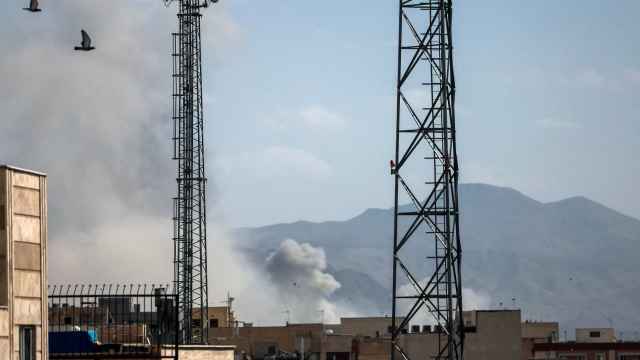The public knows little about what President Dmitry Medvedev and Kommersant journalist Oleg Kashin really talked when they met in Israel last week because the Kremlin censored the interview.
Kashin, who was brutally beaten in Moscow by unidentified assailants in early November, was in Israel undergoing rehabilitation for his injuries. Last week, Medvedev traveled to the West Bank on an official visit. While in Jericho, Kashin had what he said was a “chance encounter” with the president.
In his Twitter blog, the journalist wrote, “I was out walking by myself near the entrance to the palace when, just by chance, Medvedev walked up to me, asked about my health and told me not to alter my stance.”
During the interview, Medvedev also promised to “tear the heads” off the people who attacked Kashin. Soon after, the media spread reports of that comment throughout Russia and the world. In an interview with the Internet-based television station Dozhd, Kashin confirmed that it had been a chance encounter with the president and said, “I asked him several questions, and I hope that it will be published tomorrow in Kommersant as a small interview.”
The next day, a small interview with Medvedev was not published by Kommersant. According to sources at the newspaper, a short piece was initially planned, but it was pulled at the last minute at the request of presidential press secretary Natalya Timakova.
During the interview, Kashin asked Medvedev why the Kremlin supported youth movements whose members had shouted obscene slogans at opposition leader Boris Nemtsov as he left prison after 15 days in confinement. Medvedev answered that the Kremlin does not support these movements and that they have their own sponsors, just as Nemtsov has his own doners.
So, Medvedev is prepared to rip the heads off Kashin’s attackers, but he is hesitant to authorize publication of an interview with Kashin. Perhaps Kremlin spin doctors did not want to publicize offhand remarks by the president that could have been interpreted very broadly.
This was not the first time Timakova censored her boss. When Medvedev met with a group of Kremlin-friendly musicians in mid-October over beer, he apparently let his guard down and made a slight jab at Prime Minister Vladimir Putin: “In contrast to my colleagues, I know who Yury Shevchuk is.”
Medvedev was referring to a May meeting between Putin and Shevchuk, a well-known rock musician, in which Putin said he didn’t know Shevchuk. Since this was widely viewed as a PR flub on Putin’s part, Timakova wanted to avoid the topic entirely and asked all journalists at Medvedev’s October meeting with the musicians to leave Medvedev’s comment about Shevchuk out of their stories to avoid any unnecessary speculation about a split in the tandem.
Perhaps this time Kremlin spin doctors did not want to publicize offhand remarks by the president that could have been interpreted as Medvedev’s quip at pro-Putin youth movements.
Equally plausible is that the Kremlin press service got a little puzzled by the way Kashin claimed that the interview — clearly arranged beforehand — was presented as a chance encounter on the street. In the end, the Kremlin decided that, although they might feel some empathy for Kashin’s suffering, he doesn’t deserve the privilege of having a full-scale interview with the president published in Kommersant.
Alexei Pankin is editor of IFRA-GIPP Magazine for publishing business professionals.
A Message from The Moscow Times:
Dear readers,
We are facing unprecedented challenges. Russia's Prosecutor General's Office has designated The Moscow Times as an "undesirable" organization, criminalizing our work and putting our staff at risk of prosecution. This follows our earlier unjust labeling as a "foreign agent."
These actions are direct attempts to silence independent journalism in Russia. The authorities claim our work "discredits the decisions of the Russian leadership." We see things differently: we strive to provide accurate, unbiased reporting on Russia.
We, the journalists of The Moscow Times, refuse to be silenced. But to continue our work, we need your help.
Your support, no matter how small, makes a world of difference. If you can, please support us monthly starting from just $2. It's quick to set up, and every contribution makes a significant impact.
By supporting The Moscow Times, you're defending open, independent journalism in the face of repression. Thank you for standing with us.
Remind me later.





